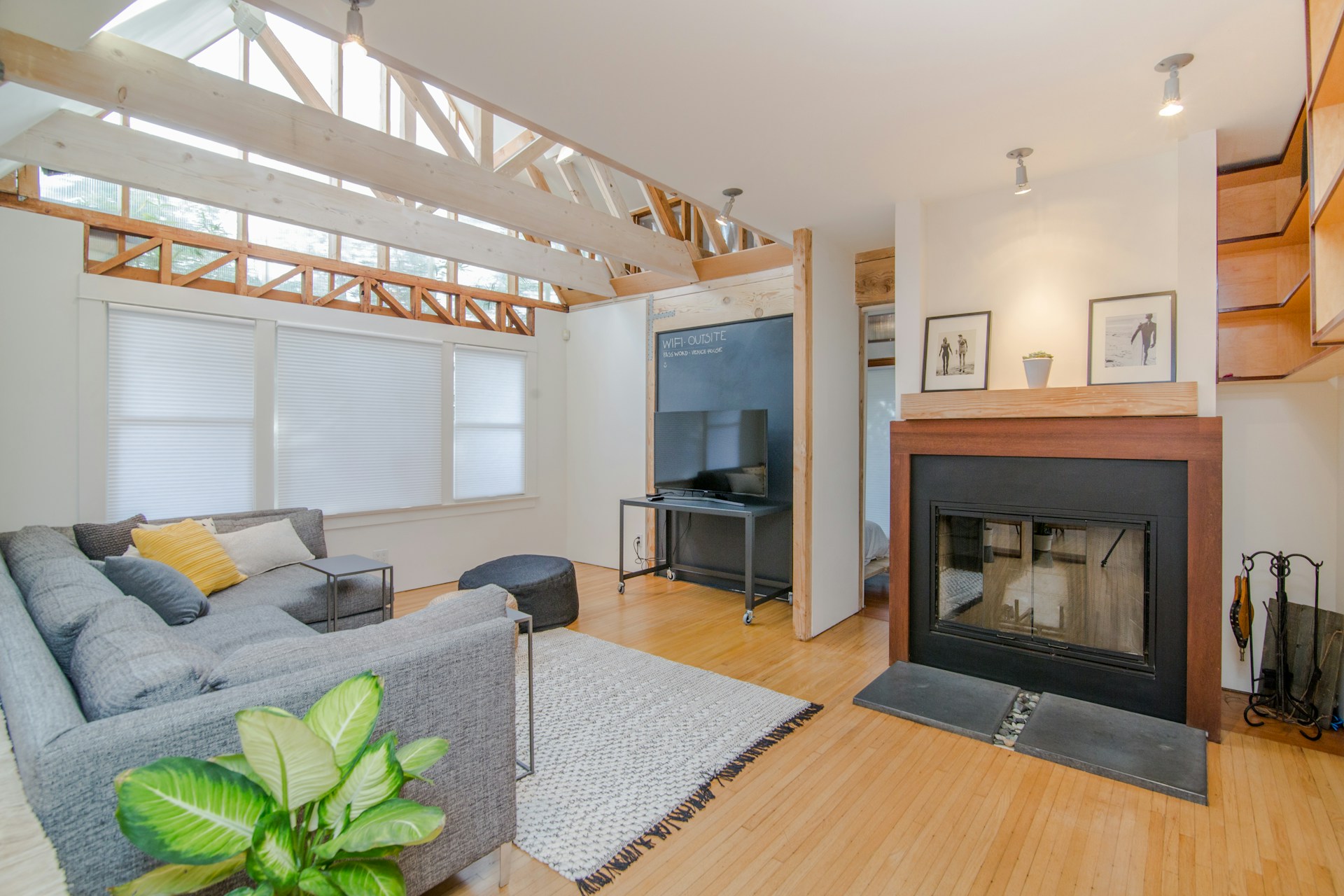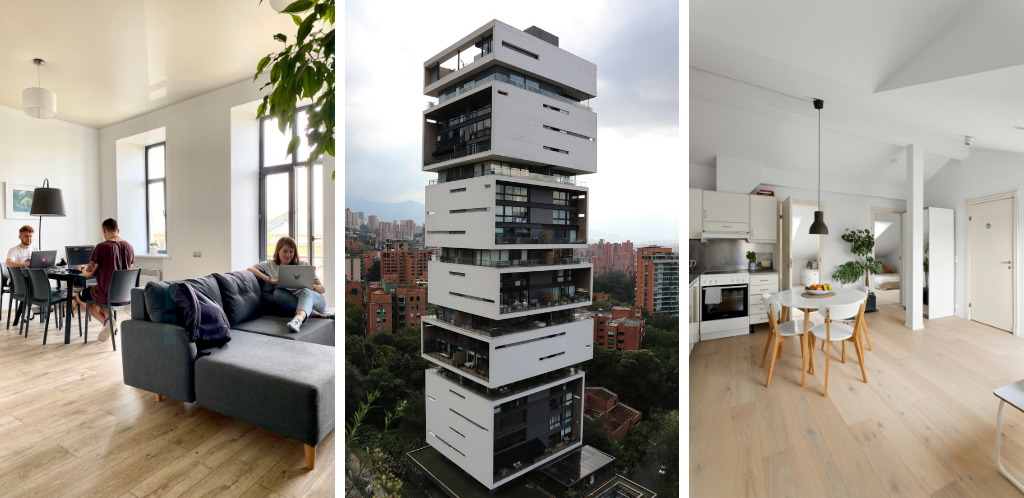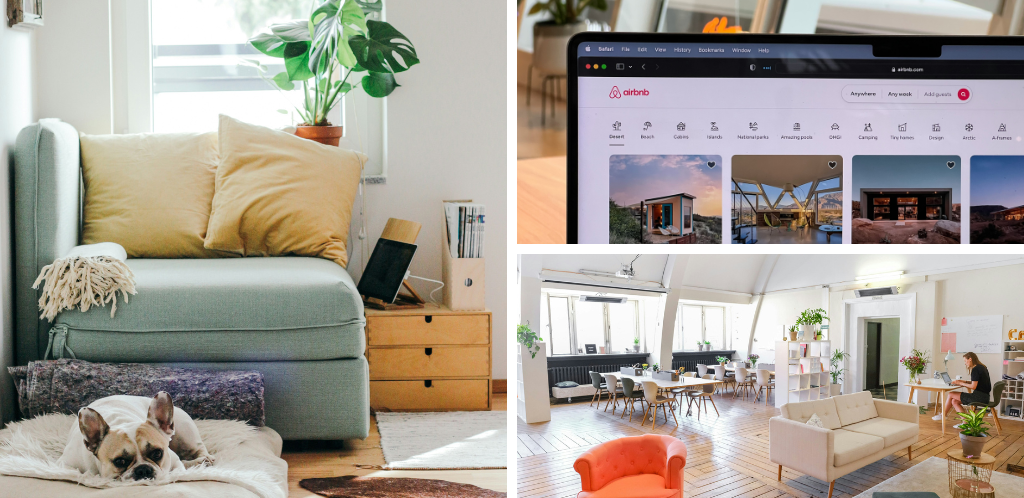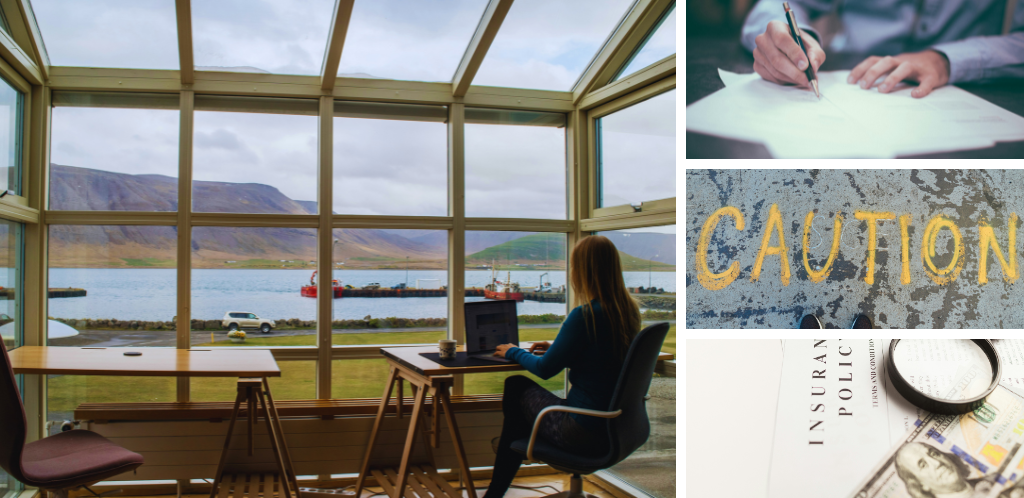Top Accommodation Options for Digital Nomads: Flats and Apartments Guide
We tell you what you should look for in digital nomad accommodation, where to find it and how to avoid getting scammed when booking it.
You’re thrilled to begin your journey as a digital nomad. With a new remote job that lets you work from anywhere in the world, you’ve picked your dream destination and even booked your tickets. Now comes the first hurdle: how do you find digital nomad accommodation?
Living as a digital nomad is an exciting adventure, but it comes with its own set of challenges. One of the toughest is finding the right accommodation in each new location. It’s not just about choosing a nice place in a great area; for remote work, essentials like a reliable internet connection and a quiet workspace can make all the difference between a smooth experience and a stressful one. Although we’ve talked in the past about how to become a digital nomad, today we’re diving deeper into one of the most crucial choices you’ll face each time you relocate.

Plans that may interest you
What does a digital nomad accommodation need to have?
It might be tempting to book a place based on the features you’d look for at home, but before you hit that button, it’s worth considering a few extra factors. It’s not enough that it’s nice or central. The remote working lifestyle requires certain amenities and specific features. For an accommodation to be ideal for this type of traveler, it must meet some minimum standards, key aspects that will facilitate both work and wellbeing. Some of the things to look for when choosing your accommodation as a digital nomad are:

Stable and fast internet connection
When you depend on the internet for work, a bad connection can mean a day’s work is lost. It can even cause you to fail to meet your obligations. That’s why a fast, reliable internet connection is one of the top priorities for any digital nomad when choosing accommodation. A stable connection should support video calls, collaborative tools, and large file uploads without issues. Some platforms, like Airbnb, now even let hosts specify their internet speed, making it easier to find a place that meets your needs.
Furnishing
For digital nomads, a fully furnished space is essential. Constant mobility means you can’t carry your own furniture or appliances, so accommodation should include the essentials: bed, desk, comfy chair, equipped kitchen and basics such as appliances. This will allow you to feel at home right from the start without having to spend time and money setting up the place.
Space to work remotely
A dedicated workspace is essential for productive remote work, yet not all accommodations are designed with long hours at a computer in mind. Look for a setup that includes a spacious desk, an ergonomic chair, and good lighting. Additionally, it’s important to have the work area separate from your rest space, allowing you to fully unwind and recharge once the workday is over.
Connection to a reliable power source
Having access to a stable power source is vital, especially if the destination you choose to work in does not have a completely reliable electricity infrastructure. In some countries, power outages are frequent, so it’s wise to check on power stability before committing to a place. Many digital nomads even bring a portable battery to ensure they can keep working during unexpected outages.
Calm environment
A quiet environment is essential for staying focused and productive. Even the most beautiful accommodation can become frustrating if it’s in a noisy area. Before booking, check if it’s near busy streets or loud bars, and read reviews from previous guests to confirm that the space is quiet enough for work.
Safe zone
Personal safety is essential, especially if you are in a foreign country where you are unfamiliar with local customs and security levels. Before you book accommodation, make sure it is in a safe area. Check reviews from other travelers, research the neighborhood and ask locals about safety in the area. An additional tip is that the accommodation has security locks and surveillance cameras in the building.
Flexibility in the length of stay
One of the most common problems faced by digital nomads is the lack of flexibility in renting. Many landlords prefer multi-month contracts, which does not suit the lifestyle of those who move frequently. Look for accommodation that offers flexibility in check-in and check-out dates and allows for short stays, ideally one month or more.
Good environment for socializing
Work is important, but so is a social life. Many digital nomads seek accommodation in areas where they can interact with other travelers or remote workers. In some cities, it is common for nomads to seek accommodation in certain neighborhoods with a large expat community. This is the case in Nimman in Chiang Mai, for example.
On the other hand, accommodation that offers common areas, such as living rooms or shared kitchens, can be a key point for creating new friendships and collaborating with other digital nomads.
Options to find accommodation for digital nomads
As we mentioned in our post on digital nomad statistics, the number of people adopting this lifestyle tripled between 2019 and 2023, reaching 35 million—and it’s still growing. As a result, finding suitable accommodation for remote working is becoming easier and easier. More and better options have emerged to find accommodation adapted to the needs of remote workers. From specialized platforms to communities of travelers, the alternatives are varied and suit different budgets and lengths of stay. Here are the best ways to find digital nomad accommodation:

Traditional booking sites
While traditional hotel and accommodation booking sites are designed for short-term travelers, such as tourists or business travelers, they can be useful for digital nomads looking for a longer stay. Platforms such as Booking.com or Agoda offer options to book accommodation by the week or month. They also allow you to filter by price, room type and location. These sites also include reviews from other guests, which is key to assessing the quality of the internet connection or the tranquility of the place.
Colivings
Colivings are spaces designed especially for digital nomads. They offer accommodation and shared workspaces in one place, which facilitates integration between travelers and encourages networking. They also have adequate facilities for remote work, such as meeting rooms, desks and, most importantly, high-speed internet. Platforms such as Selina and Outsite are some of the most popular for finding this type of accommodation.
Home exchange platforms
Home exchange platforms have gained popularity among digital nomads. These platforms allow you to stay in someone else’s home in exchange for offering your own place in your home country. Not only does this help you save on accommodation costs, but it’s also an excellent way to live like a local and immerse yourself in new cultures. Platforms like HomeExchange or Love Home Swap are great for those looking for a cheap and safe alternative.
Online communities for digital nomads
Online communities for digital nomads, such as Nomadlist, not only offer advice on the best destinations, but also include listings of accommodation recommended by other travelers. Because they are made up of people with the same lifestyle, these communities allow you to get first-hand knowledge of the quality of an accommodation and its features, such as the stability of the Internet connection or the safety of the neighborhood.
Extended stay hotels
Extended stay hotels are an ideal option for digital nomads looking for flexibility and convenience without having to commit to a rental contract. These hotels tend to offer lower rates for those staying for weeks or months at a time, and also come with included services such as laundry, cleaning and, of course, fast and free Wi-Fi. Some hotel chains that offer this type of accommodation are Staybridge Suites or Residence Inn.
House sitting
Another option that is attracting more and more digital nomads is house sitting, an exchange where you look after a house (and sometimes pets) while the owner is away. In return, you get free accommodation. Sites like TrustedHousesitters are perfect for finding such opportunities. It is ideal for those who want to stay in a city for a limited time and have no problem taking on some responsibilities in exchange for accommodation.
Important: If you are a frequent traveler and want to stay connected without worrying about expensive roaming or looking for a new SIM at every destination, Holafly’s subscription plans are for you. With a single eSIM, enjoy internet in more than 170 countries for a fixed price and no surprises on your bill. travel without limits and connect easily and securely! 🚀🌍

Work and travel programes
Work and travel is an option for those who are not only looking for accommodation, but also the possibility to work in exchange for accommodation. These programmes allow digital nomads to stay in hostels, farms or small businesses while contributing a few hours of work per day. Workaway and Worldpackers are examples of platforms where you can find such opportunities.
Real estate portals
Another alternative is to use flat search engines, such as Idealista or Fotocasa, which allow you to search for flats and houses for longer stays. These platforms are more oriented towards traditional rentals, but offer flexibility if you are willing to rent for a few months. In addition, on these platforms you can filter by specific characteristics such as internet connection, furniture, and proximity to commercial or coworking areas.
Facebook Groups
Facebook groups are an excellent source of short- and long-term accommodation. There are many local groups for expats and digital nomads where members share rental recommendations and available housing. Many landlords post their rental flats in these groups. In addition, some digital nomads post the flats they are leaving, in case someone wants to take over.
These groups are also useful for connecting with other travelers and getting up-to-date information on the rental situation in each destination.
Family and friends
Never underestimate the option of having family, friends or acquaintances who live in the city or country where you plan to stay. They can often recommend places they know first-hand or even offer you a space in their home. This is an excellent option to start your adventure as a digital nomad with the peace of mind of being close to someone you trust. They can also give you a more authentic view of the destination and help you adapt faster to the new culture and lifestyle.
Safety tips when looking for digital nomad accommodation

Finding suitable accommodation as a digital nomad can be tricky, but security should always be a priority. Whether you use online platforms, social media or personal recommendations, it is crucial to follow certain guidelines to protect yourself from potential scams or uncomfortable situations. Some of the things you should keep in mind to ensure your safety when looking for accommodation as a digital nomad are:
- Check the reputation of the site or owner: before making any booking or agreement, it is essential to check the reputation of the accommodation and the host or owner. If you are using well-known platforms such as Airbnb or Booking, be sure to check reviews from other users. If it is a long term rental, look for information on social media, blogs or expat communities to check the experience of other digital nomads in the same area or property.
- Never send money upfront without guarantees: One of the most common mistakes is to send money upfront before you have checked the veracity of the accommodation. If the owner insists on an upfront payment without offering clear proof of the authenticity of the place, this can be a red flag. Use platforms that offer secure payment methods or hold the money until you arrive at the accommodation and verify that everything is in order. Platforms such as Airbnb already have this option.
- Use clear rental contracts: for long stays or direct rentals, it is always advisable to sign a clear and detailed rental contract. This contract should include the conditions of the stay, the agreed price, the services included and the responsibilities of both parties. Make sure the contract is in writing and, if possible, translated into a language you know well. This will avoid misunderstandings or abuses during your stay. If necessary, hire someone to draw up the contract for you. In some countries, there are real estate agencies that sell standard contracts even if you do not hire their services.
- Avoid too-good-to-be-true offers: If an accommodation is unusually cheap or offers more perks than similar options, it could be a red flag. Misleading ads are common, especially on social media groups or unverified platforms. If something feels off, cross-check the property on other sites (you can even use Google Lens to search for photos) or look for reviews of the host to verify the legitimacy of the offer.
- Don’t share unnecessary personal information: when looking for accommodation online, never share more personal information than necessary, such as your passport number, bank account or payment details, until you are sure of the legitimacy of the owner or the platform you are using. Opt for platforms that offer secure internal messaging systems and always protect your personal data.
- Keep clear and recorded communication: it is always advisable that all communication with the host or owner is recorded in writing. This will allow you to have evidence in case of disputes or misunderstandings. If you communicate via platforms that do not have internal messaging, be sure to save emails or screenshots of conversations so that you have everything backed up.
- Consult with the digital nomad community: One of the great advantages of the digital nomad life is the extensive network of online communities that share experiences and advice. Before deciding on accommodation, check out forums and digital nomad groups for recommendations on the destination, the neighborhood or even specific accommodations. Sites such as Nomadlist or Facebook groups can be invaluable sources of risk avoidance.
- Check the location and safety of the area: not all destinations offer the same level of security, so it is essential to research the area where you plan to stay. Use tools such as Google Maps to explore the neighborhood, check reviews from other travelers and check local crime statistics. It is also useful to ask locals or other digital nomads about safety in the area, especially if you plan to stay for a long time.
- Prioritize accommodation with security measures: When choosing accommodation, give priority to those that offer adequate security measures, such as security locks, surveillance cameras or controlled access. If you are staying in a coliving or shared flat, make sure that common areas and access to the building are well protected to prevent theft or intrusion. Don’t hesitate to ask about security before confirming your stay – it’s better to be safe than sorry.
- Have a plan B in case of unforeseen events: Last but not least, it is essential to have a plan B. Even if you have done all the necessary checks, unforeseen events may arise, such as accommodation that does not deliver as promised or last-minute problems. Make sure you have alternative options for the first few days, such as a hotel or a coliving, until you find the perfect and safe accommodation. For this, being able to have internet access with your Holafly eSIM from the first minute you arrive at your destination will be very useful. It will allow you to stay connected at all times and be able to do quick searches or contact other options if any problems arise.
Frequently asked questions when looking for accommodation as a digital nomad
The length of time you rent will depend a lot on your lifestyle and work projects. Some digital nomads prefer more flexible contracts, such as one-week or one-month stays, so that they can move quickly if they want to. Others look for longer rental contracts of six months or more if they plan to stay in one destination for an extended period of time. It is best to start with short stays until you feel comfortable with the place. In addition, more and more accommodations are offering flexible options, such as medium-term rentals.
There are several platforms that are perfectly suited to the digital nomad lifestyle. Some of the most popular are Airbnb and Booking for short to medium term stays. You can also explore specific coliving platforms such as Outsite or NomadX that are designed for digital nomads. Also, if you are looking for accommodation in exchange for work, programmes such as Workaway or WWOOF are an excellent option. Remember to always check the host’s reputation and read reviews before making any payments.
Booking accommodation on Facebook groups can be useful, but you should be very careful. It is always advisable to verify the identity of the host or owner and avoid making advance payments without clear proof of the authenticity of the place. Look for reviews from other travelers in the comments or ask for references. If possible, make payment through secure payment platforms that offer buyer protection.
In case the accommodation does not meet your expectations or what was promised upon arrival, it is important that you document any problems immediately. Take photos and contact the owner or host to resolve the problem amicably. If you booked through a platform such as Airbnb or Booking, contact their customer service. In case the problem is not resolved, some platforms offer the option of a refund or transfer to another accommodation.
The cost of accommodation for digital nomads varies from country to country and city to city. In cheaper destinations such as Southeast Asia, you can find rooms for around $300-500 per month, while in Europe or more expensive cities such as London or New York, prices can exceed $1,500 per month. It will also depend on whether you are looking for coliving, traditional housing or exchanging work for accommodation, all of which can significantly reduce costs.






































 Pay
Pay  Language
Language  Currency
Currency 


















 No results found
No results found






